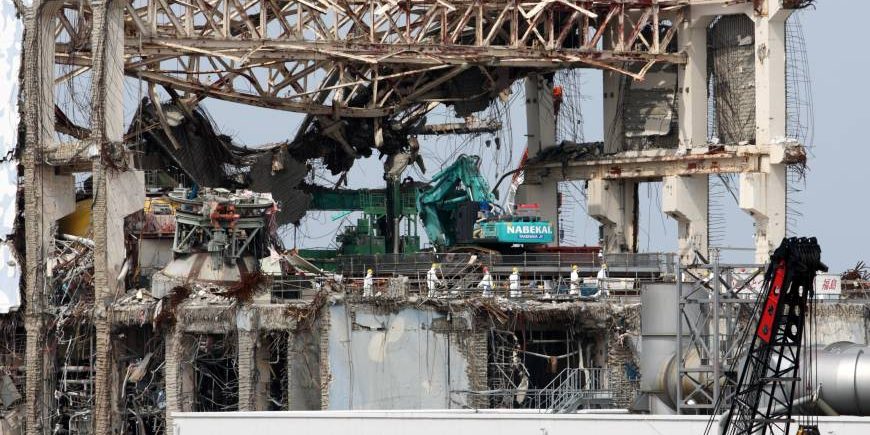The International Atomic Energy Agency released its comprehensive — but mostly ignored — final report on Fukushima on Aug. 30.
It blamed the March 2011 triple meltdowns at Tokyo Electric Power Co.’s Fukushima No. 1 power plant on a blind belief in “the nuclear safety myth.” In other words, the myth that Japan’s
“nuclear power plants were so safe that an accident of this magnitude was simply unthinkable.”
“The regulation of nuclear safety in Japan at the time of the accident was performed by a number of organizations with different roles and responsibilities and complex interrelationships,” the report said.
“It was not fully clear which organizations had the responsibility and authority to issue binding instructions on how to respond to safety issues without delay.
The regulations, guidelines and procedures in place at the time of the accident were not fully in line with international practice in some key areas, most notably in relation to periodic safety reviews, re-evaluation of hazards, severe accident management and safety culture.”
I’m sure we all remember the “unforeseeable” accident that happened in Fukushima in March 2011, an accident that will take an estimated 40 years and billions of dollars to clean up, some of it already subsidized with taxpayer money and higher electric bills.
Having restarted a reactor at the Sendai nuclear power plant in Kagoshima in August, one might suspect that the administration of Prime Minister Shinzo Abe and Kyushu Electric Power Co. don’t appear to remember this accident very well.
For a start, putting the reactor in Kagoshima back online didn’t exactly go according to plan. Despite months of inspection, seawater was detected in the reactor’s cooling system in late August. Alarm bells sounded.
In spite of all the checks and balances that were introduced in the wake of the Fukushima disaster, power utilities are continuing to drop the ball as far as their reactors are concerned. How can we ensure such oversight is avoided?
Katsunoba Onda, author of “Tepco: The Darkness of the Empire,” which predicted in 2007 the nuclear accident at Fukushima, and lawyer Hiroyuki Kawai, who established the National Network of Counsels in Cases against Nuclear Power Plants, have proposed a very simple way of ensuring this happens: hold nuclear plant operators criminally liable for negligence. The threat of incarceration might help them take their work more seriously and less likely to cut corners.
The Prosecutorial Review Board appears to back such a proposal, approving the first criminal prosecutions of three former Tepco executives last July. The board consists of a panel of 11 private citizens, who operate under a rarely used set-up in the Japanese legal system that allows outsiders to review prosecutors’ decisions.
The panel ordered that Tsunehisa Katsumata, chairman of Tepco at the time of the accident, and two former heads of the utility’s nuclear division, be charged with professional negligence resulting in death and injury.
Prosecutors, however, have to date been slow to pursue criminal liability in the case. They did accept submissions from the public but then leaked their decision not to prosecute just as Japan won the right to host the 2020 Olympic Games. The story, however, doesn’t end there.
This decision was again sent to the Prosecutorial Review Board, which again recommended that a criminal case be filed. For the second year in succession, the Prosecutorial Review Board overruled the prosecutors.
Prosecutors have reportedly continued to reject the case because “it is not possible to prove negligence.”
The IAEA report is expected to be submitted as evidence showing the exact opposite.
“When you have a disaster of this scale, isn’t it crazy not to pursue responsibility?” Kawai, who led the citizen’s group that filed charges with the prosecutors, told Nikkan Gendai. “The common sense of the people overturned the judgment of prosecutors, prosecutors who favor large companies and the powerful. Tepco knew about the possibility of a large-scale tsunami and did nothing about it. The idea that if it’s not easily foreseeable, no one is responsible is mistaken. Abe says ‘Japan has the safest nuclear standards in the world.’ He’s the only one saying it. It’s not true. The Abe administration’s push for war and for nuclear energy are very dangerous — one mistake and this country will be destroyed.”
If the Tepco executives are tried in court and found guilty, it wouldn’t be the first time nuclear power operators were convicted of criminal negligence resulting in death. In 1999, two employees died in an accident at the Tokaimura power plant run by JCO, a nuclear fuel cycle company. Six of the company’s executives were later charged and pleaded guilty to criminal charges of negligence resulting in the deaths.
They were all given suspended sentences.
“Dark Side of the Rising Sun is a monthly column that takes a behind-the-scenes look at news in Japan.”
Sourced from The Japan Times News







